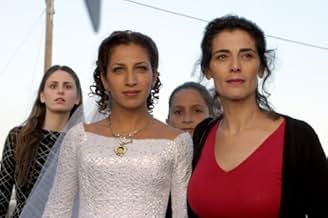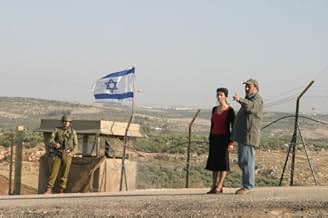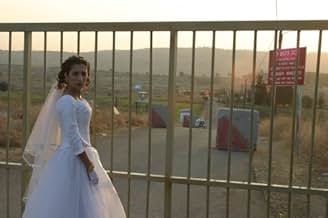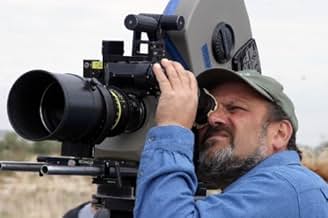NOTE IMDb
7,4/10
3,5 k
MA NOTE
Mona doit se rendre en Syrie pour finaliser les détails du mariage arrangé entre elle et son cousin, une star de la télé. Mona sait qu'une fois là-bas, elle ne pourra plus jamais revoir sa f... Tout lireMona doit se rendre en Syrie pour finaliser les détails du mariage arrangé entre elle et son cousin, une star de la télé. Mona sait qu'une fois là-bas, elle ne pourra plus jamais revoir sa famille sur le plateau du Golan.Mona doit se rendre en Syrie pour finaliser les détails du mariage arrangé entre elle et son cousin, une star de la télé. Mona sait qu'une fois là-bas, elle ne pourra plus jamais revoir sa famille sur le plateau du Golan.
- Réalisation
- Scénario
- Casting principal
- Récompenses
- 8 victoires et 15 nominations au total
Hiam Abbass
- Amal
- (as Hiyam Abbass)
Makram Khoury
- Hammed
- (as Makram J. Khoury)
Ashraf Barhom
- Marwan
- (as Ashraf Barhoum)
Evelyn Kaplun
- Evelyna
- (as Evelyne Kaplun)
Adnan Tarabshi
- Amin
- (as Adnan Trabshi)
Marlene Bajali
- The Mother
- (as Marlene Bajjali)
Uri Gavriel
- Simon
- (as Uri Gabriel)
Robert Henig
- Joseph
- (as Robert Hoenig)
Avis à la une
After Israel took the Golan Heights from Syria in the 1967 war, 17,000 ethnic Druze, whose people had been living in the area for centuries, suddenly found their lives fractured and their families divided by an impassable border. In spite of substantial economic and educational gains made under Israeli rule, the Druze of the Golan still consider themselves to be Syrians living under Israeli occupation. They do not intermingle with Israelis, refuse to hold Israeli passports, and live in their own villages. A French/German/Israeli co-production, The Syrian Bride tells the story of one such family as they prepare to attend their daughter's wedding on the Syrian border. It is primarily a comedy yet it is also a poignant drama that takes no sides but attempts to put the political turmoil in the region into a humanistic context.
Mona (Clara Khoury), a young Druze bride is to be wed to Syrian TV-star Tallel (Derar Sliman) from Damascus, a man she has never met. Since neither country recognizes the other diplomatically, once the bride crosses the border to Syria, she will never be allowed to return to Israel and her wedding day, usually a day of great joy, may be one of her saddest. While the film tells us much about the sad realities of the political fragmentation in the Middle East, it is also a story with social and cultural ramifications. Mona's sister Amal (Hiyam Abbas), whose expressive face frames the film's beginning and end, is stuck in an unhappy marriage. She wants to attend Haifa University but is thwarted by her husband Amin (Adnan Trabshi) who is afraid of losing face in the village and of relinquishing "control".
Mona's father Hammed (Makram Khoury), a pro-Syrian agitator known to Israeli police, is forbidden to travel to the Syrian border to say goodbye to his daughter. He harbors resentment and refuses to welcome his son Hattem (Eyad Sheety) and his Russian wife home from Moscow because he broke family tradition and moved away eight years ago. Another son, Marwan (Ashraf Barhom), a businessman, is welcomed by the family but is rejected by an angry former girlfriend, a French Red Cross worker (Julie-Anne Roth), who works in the village. Mona's character is mostly symbolic and she has little to say, yet the story of the film is written on her face and her lack of dimensionality is more than compensated for by the depth of the supporting characters, particularly Hattem and Amal.
As these conflicts bubble under the surface, the situation becomes increasingly absurd as the wedding is threatened by bureaucratic intransigence on the border checkpoints between Israel and Syria. Mona's passport has an Israeli stamp on it and, according to Syrian regulations, anyone carrying a passport with an Israeli stamp is denied entry to Syria. Neither Israeli nor Syrian customs officials seem to know what to do and the prospective bride and groom are stuck in a no-man's land, reduced to communicating via bullhorns pressed against locked gates. The Syrian Bride may sound like an exercise in absurdity bordering on farce, yet for the family who may never see their child again, it is a drama of high seriousness. Whether you consider The Syrian Bride to be an allegory, black comedy, family drama, or political statement, the image of a girl sitting alone in a white wedding dress stuck between impenetrable barriers is one that remains.
Mona (Clara Khoury), a young Druze bride is to be wed to Syrian TV-star Tallel (Derar Sliman) from Damascus, a man she has never met. Since neither country recognizes the other diplomatically, once the bride crosses the border to Syria, she will never be allowed to return to Israel and her wedding day, usually a day of great joy, may be one of her saddest. While the film tells us much about the sad realities of the political fragmentation in the Middle East, it is also a story with social and cultural ramifications. Mona's sister Amal (Hiyam Abbas), whose expressive face frames the film's beginning and end, is stuck in an unhappy marriage. She wants to attend Haifa University but is thwarted by her husband Amin (Adnan Trabshi) who is afraid of losing face in the village and of relinquishing "control".
Mona's father Hammed (Makram Khoury), a pro-Syrian agitator known to Israeli police, is forbidden to travel to the Syrian border to say goodbye to his daughter. He harbors resentment and refuses to welcome his son Hattem (Eyad Sheety) and his Russian wife home from Moscow because he broke family tradition and moved away eight years ago. Another son, Marwan (Ashraf Barhom), a businessman, is welcomed by the family but is rejected by an angry former girlfriend, a French Red Cross worker (Julie-Anne Roth), who works in the village. Mona's character is mostly symbolic and she has little to say, yet the story of the film is written on her face and her lack of dimensionality is more than compensated for by the depth of the supporting characters, particularly Hattem and Amal.
As these conflicts bubble under the surface, the situation becomes increasingly absurd as the wedding is threatened by bureaucratic intransigence on the border checkpoints between Israel and Syria. Mona's passport has an Israeli stamp on it and, according to Syrian regulations, anyone carrying a passport with an Israeli stamp is denied entry to Syria. Neither Israeli nor Syrian customs officials seem to know what to do and the prospective bride and groom are stuck in a no-man's land, reduced to communicating via bullhorns pressed against locked gates. The Syrian Bride may sound like an exercise in absurdity bordering on farce, yet for the family who may never see their child again, it is a drama of high seriousness. Whether you consider The Syrian Bride to be an allegory, black comedy, family drama, or political statement, the image of a girl sitting alone in a white wedding dress stuck between impenetrable barriers is one that remains.
The story line touches many open sores afflicting the Israeli society, prejudice towards ethnic minorities, unwillingness of factions in that society to try and understand and accept one another, police bigotry and sheer racism. As an Israeli living abroad I could relate to all of the above. However, you don't have to be from that region to appreciate this moving and powerful Drama. The film basically deals with the horrific struggle of a family, from a marginalised sector of Israeli society, to get their daughter married to a man over the Syrian boarder however, by doing that they will never be able to see her again. A very very emotional and humane film.
This deceptively modest 2004 film lingers in the memory because of the bigger sociopolitical context that Israeli director Eran Riklis provides in setting his story in the Golan Heights, an area occupied by Israel since the Six-Day War in 1967. Over the course of one day, the story revolves around an extended Druze family in the northern village of Majdal Shams where they are preparing for the wedding of youngest daughter Mona. The catch is that she has never met the groom, a distant relative who happens to be a big Syrian TV personality in Damascus. It sounds like the source of comedy hijinks, but there is a sad undertone because once married, Mona officially becomes Syrian and cannot return home to her family.
The intended couple, however, is not the focus as much as the family dynamics that become ignited by the wedding. The patriarch is Hammed, a political activist on probation, and he has two sons - Hattem, who has been cast out by the conservative religious cabal for leaving the country and marrying a Russian woman, and Marwan, who provides the comedy relief as a womanizing salesman. The glue of the family, however, is provided by eldest sister Amal, who defiantly stands up to the men in her family and wants to get her bachelor's degree in Haifa. The first hour deals mainly with the standard pre-wedding confusion, though it happens to take place on the same day that Syrian President Bashar al-Assad succeeded his father, but the last half-hour takes place entirely at the Israel-Syria border crossing where the officials from both countries refuse to cooperate with a negotiating Red Cross worker in allowing Mona to enter Syria.
With its primarily somber tone, this is no Middle Eastern derivative of "My Big, Fat Greek Wedding", but Riklis and co-screenwriter Suha Arraf supply genuine warmth toward the characters and bring immediacy and credibility to the personal situation at hand. The acting is solid with Hiam Abbass the standout as Amal. There are nice turns by Makram Khoury as Hammed, his real-life daughter Clara as Mona, Eyad Sheety as Hattem and Ashraf Barhom who steals scenes as the gap-toothed Marwan. Special mention should be made for Michael Wiesweg's expert cinematography which perfectly captures the mostly sun-baked terrain. This is a case where the 2006 DVD package from Koch Lorber is invaluable for the context it provides to the movie's story. The making-of featurette, an extensive interview with Riklis and his accompanying commentary all help considerably in understanding the political situation that both drives and reflects the wedding preparation complications. Also included is the original trailer as well as the U.S. version.
The intended couple, however, is not the focus as much as the family dynamics that become ignited by the wedding. The patriarch is Hammed, a political activist on probation, and he has two sons - Hattem, who has been cast out by the conservative religious cabal for leaving the country and marrying a Russian woman, and Marwan, who provides the comedy relief as a womanizing salesman. The glue of the family, however, is provided by eldest sister Amal, who defiantly stands up to the men in her family and wants to get her bachelor's degree in Haifa. The first hour deals mainly with the standard pre-wedding confusion, though it happens to take place on the same day that Syrian President Bashar al-Assad succeeded his father, but the last half-hour takes place entirely at the Israel-Syria border crossing where the officials from both countries refuse to cooperate with a negotiating Red Cross worker in allowing Mona to enter Syria.
With its primarily somber tone, this is no Middle Eastern derivative of "My Big, Fat Greek Wedding", but Riklis and co-screenwriter Suha Arraf supply genuine warmth toward the characters and bring immediacy and credibility to the personal situation at hand. The acting is solid with Hiam Abbass the standout as Amal. There are nice turns by Makram Khoury as Hammed, his real-life daughter Clara as Mona, Eyad Sheety as Hattem and Ashraf Barhom who steals scenes as the gap-toothed Marwan. Special mention should be made for Michael Wiesweg's expert cinematography which perfectly captures the mostly sun-baked terrain. This is a case where the 2006 DVD package from Koch Lorber is invaluable for the context it provides to the movie's story. The making-of featurette, an extensive interview with Riklis and his accompanying commentary all help considerably in understanding the political situation that both drives and reflects the wedding preparation complications. Also included is the original trailer as well as the U.S. version.
A wedding in the family, usually a happy event for everyone involved, turns out to be a sad affair. This particular one will mark the destiny of Mona, a young Druze woman living in the Golan Heights, now under Israeli rule. Like her parents, Mona considers herself Syrian. She stands to lose the privilege of ever going back, even for a visit, when she crosses the border where her future husband, a Syrian actor, awaits for her with his own entourage.
"The Syrian Bride" was a surprise. Directed with honesty by Eran Riklis, who also co-wrote the screen play with Suha Arraf, the film takes no sides between one faction, or another. In many ways, the movie seems to be sympathetic toward the Druze family, but in no way it felt preachy, or frankness in its presentation of what goes on in that troubled part of the world.
The family at the center of the story is not a happy one. The father, Hammed, has been in prison for his pro-Syrian views. He has also estranged himself from his two sons, Hattem, who has married a Russian doctor and now lives abroad and Marwan, a businessman of sorts, based in Italy. The oldest daughter, Amal, a sensitive woman, has a troubled marriage herself to a man who can't understand her need to assert herself and go to college. It is a male dominated society where women don't seem to have much to contribute except have children and be housewives.
Most impressive in the film is Hiam Abbass, an actress we have admired from her previous work, notably, "Satin Rouge" and "Paradise Now". She has a quiet way of getting under the skin of the role she is playing; this woman shows such dignity in her work that it's hard to take ones eyes from her once she is on the screen. Makram Khoury is seen as the patriarch, Hammed. Clare Khoury is also effective as the bride who must leave family and friends to go to another world. Eyad Sheety and Ashraf Barhom play the two brothers.
"The Syrian Bride" is a satisfying film by Eran Riklis, a talented director who shows great sensibility toward the material.
"The Syrian Bride" was a surprise. Directed with honesty by Eran Riklis, who also co-wrote the screen play with Suha Arraf, the film takes no sides between one faction, or another. In many ways, the movie seems to be sympathetic toward the Druze family, but in no way it felt preachy, or frankness in its presentation of what goes on in that troubled part of the world.
The family at the center of the story is not a happy one. The father, Hammed, has been in prison for his pro-Syrian views. He has also estranged himself from his two sons, Hattem, who has married a Russian doctor and now lives abroad and Marwan, a businessman of sorts, based in Italy. The oldest daughter, Amal, a sensitive woman, has a troubled marriage herself to a man who can't understand her need to assert herself and go to college. It is a male dominated society where women don't seem to have much to contribute except have children and be housewives.
Most impressive in the film is Hiam Abbass, an actress we have admired from her previous work, notably, "Satin Rouge" and "Paradise Now". She has a quiet way of getting under the skin of the role she is playing; this woman shows such dignity in her work that it's hard to take ones eyes from her once she is on the screen. Makram Khoury is seen as the patriarch, Hammed. Clare Khoury is also effective as the bride who must leave family and friends to go to another world. Eyad Sheety and Ashraf Barhom play the two brothers.
"The Syrian Bride" is a satisfying film by Eran Riklis, a talented director who shows great sensibility toward the material.
I saw this one today and it completely blew me away. It's one of many truly wonderful Israeli films that were made this year. The main story is very moving and easily connected to, and the secondary plot lines are great as well. Details that are featured in the film are very accurate, for the most part, as are the situations and the characters. Viewers can easily relate to the desperate attempts to cut through the red tape, and to the bride's feelings of hopelessness and fear. Notice that the bride speaks fairly little, and yet her vacant, hardly-ever-smiling face is expressive enough. The movie simply draws you in, because of its authenticity.
The acting is superb, especially that of Markam Khoury as the father of the bride, Hiyam Abbas as the independent older sister and, of course, Klara Khoury as the Syrian Bride herself. The movie is quadrolingual, and sorta has Hebrew take a back seat. It's mostly in Arabic, and also has some English, Russian and a few words of French. Most viewers will probably be doing quite a lot of reading (subtitles) in this movie, but it's worth it.
The year of 2004 was an amazingly productive one for Israeli cinema, and The Syrian Bride is no exception. You do not want to miss this one.
The acting is superb, especially that of Markam Khoury as the father of the bride, Hiyam Abbas as the independent older sister and, of course, Klara Khoury as the Syrian Bride herself. The movie is quadrolingual, and sorta has Hebrew take a back seat. It's mostly in Arabic, and also has some English, Russian and a few words of French. Most viewers will probably be doing quite a lot of reading (subtitles) in this movie, but it's worth it.
The year of 2004 was an amazingly productive one for Israeli cinema, and The Syrian Bride is no exception. You do not want to miss this one.
Le saviez-vous
- AnecdotesMakram Khoury and Clara Khoury are father and daughter in the film as well as in real life.
- GaffesMona's father says he has raised her for 25 years. However, she states her birth date as November 30th 1976 and the movie is set on July 17th 2000. That would make her only 23 years old.
- ConnexionsFeatured in The Making of The Syrian Bride (2005)
- Bandes originalesBride Theme
Music Composed & Conducted by Cyril Morin
Performed by Bulgarian Symphony Orchestra-Sif 309
Meilleurs choix
Connectez-vous pour évaluer et suivre la liste de favoris afin de recevoir des recommandations personnalisées
- How long is Syrian Bride?Alimenté par Alexa
Détails
Box-office
- Montant brut aux États-Unis et au Canada
- 380 505 $US
- Week-end de sortie aux États-Unis et au Canada
- 7 235 $US
- 20 nov. 2005
- Montant brut mondial
- 1 522 967 $US
- Durée
- 1h 37min(97 min)
- Couleur
- Mixage
- Rapport de forme
- 2.35 : 1
Contribuer à cette page
Suggérer une modification ou ajouter du contenu manquant
































